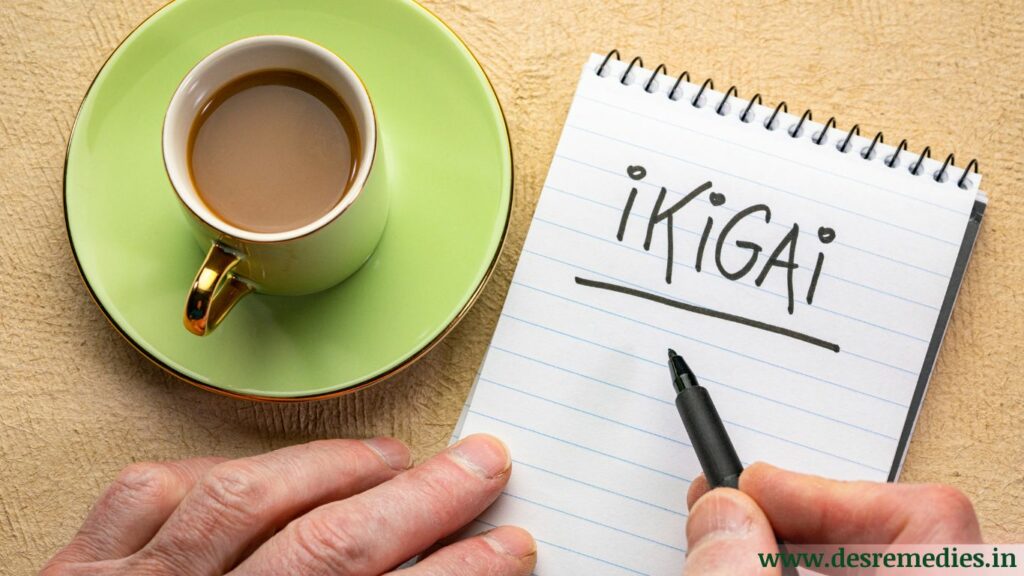
The residents of Okinawa, Japan don’t just live longer—they live better. With the world’s highest concentration of centenarians, these islanders have mastered something the rest of us are desperately seeking: a life filled with purpose, joy, and vitality well into old age.
Their secret? Ikigai daily habits—a Japanese philosophy that translates to “reason for being.”
But ikigai isn’t some mystical concept reserved for Japanese culture. It’s a practical framework backed by science that you can implement today. Research published in the Journal of Psychosomatic Research found that people with strong ikigai daily habits had a significantly lower risk of cardiovascular disease and all-cause mortality. Another seven-year study revealed that individuals without ikigai faced a 1.5 times higher mortality risk.
The beauty of these ikigai daily habits isn’t in grand gestures or expensive longevity hacks. They live in your everyday routine—the small, consistent actions that compound into a longer, more meaningful life.
Here are five science-backed ikigai daily habits that can genuinely add years to your life.
The 5 Transformative Ikigai Daily Habits for Longevity
These ikigai daily habits aren’t complex or time-consuming. Each one takes less than 30 minutes and can be seamlessly integrated into your existing routine. The key is consistency—not perfection. Let’s explore each habit and how you can start implementing them today.
1. Start Each Morning With Purpose: The Foundation of Ikigai Daily Habits
The Science: A landmark study tracking over 7,000 Japanese adults found that those who practiced ikigai daily habits showed lower rates of disability and cognitive decline over seven years.
The Habit: Before you reach for your phone or dive into emails, spend 3-5 minutes identifying your purpose for the day. This isn’t about productivity—it’s about meaning.
Ask yourself:
- What am I looking forward to today?
- How will I contribute something valuable today (however small)?
- What brings me joy today?
Why It Works: Starting your day with intention activates your prefrontal cortex and sets a mental framework that helps you make decisions aligned with your values. This sense of purpose provides psychological resilience that protects against stress and anxiety throughout the day.
Action Step: Keep a small notebook by your bed. Before checking your phone, write one sentence about what gives today meaning. It could be as simple as “I’m excited to finish that project” or “I look forward to my afternoon walk.”
2. Move Like Your Ancestors: Natural Movement as an Ikigai Daily Habit
The Science: Blue Zone populations don’t have gym memberships. Instead, they accumulate movement naturally throughout the day. Research shows that frequent, low-intensity movement throughout the day is more beneficial for longevity than intense workouts followed by prolonged sitting.
The Habit: Integrate natural movement every 30-60 minutes. The Okinawans garden, walk to neighbors’ houses, sit on floor mats (which requires getting up and down repeatedly), and perform daily chores that keep their bodies active.
Movement Ideas:
- Walk during phone calls
- Garden or tend to plants daily
- Take stairs whenever possible
- Stand up and stretch every hour
- Do household chores mindfully
- Practice floor sitting (and standing up without using your hands)
Why It Works: This pattern of movement improves circulation, maintains muscle mass, enhances joint mobility, and regulates blood sugar levels—all without the cortisol spike of intense exercise or the inflammation from prolonged sitting.
Action Step: Set hourly reminders to move for just 2-3 minutes. Over an 8-hour workday, that’s 16-24 minutes of movement that doesn’t feel like “exercise” but delivers profound health benefits.
Related read: 10 Ayurvedic Daily Self-Care Habits for a Balanced Life
3. Practice “Hara Hachi Bu”: The Mindful Eating Habit
The Science: Caloric restriction without malnutrition is one of the most reliable ways to extend lifespan across species. Okinawans consume about 1,800-1,900 calories per day compared to the Western average of 2,200-3,300.
The Habit: “Hara Hachi Bu” means eating until you’re 80% full. This Confucian-inspired practice creates a natural calorie deficit that supports healthy aging without the stress of dieting.
How to Practice:
- Eat slowly and mindfully (put your fork down between bites)
- Use smaller plates and bowls
- Pause halfway through your meal and check your hunger level
- Stop eating when you feel satisfied, not stuffed
- Wait 20 minutes before deciding if you need more food
Why It Works: Eating to 80% fullness reduces inflammation, improves insulin sensitivity, triggers beneficial cellular repair processes (autophagy), and decreases the metabolic burden on your body. The 20% gap accounts for the delay between your stomach and brain signaling satiety.
Action Step: For one meal today, eat half of what’s on your plate, then pause for 5 minutes. Check in with your body. Are you satisfied? Still hungry? This builds awareness of true hunger versus habitual eating.
4. Build Your “Moai”: Social Connection as Essential Ikigai Daily Habits
The Science: The Harvard Study of Adult Development, one of the longest studies on happiness, found that strong relationships are the single biggest predictor of life satisfaction and longevity. Loneliness increases mortality risk by 26%—comparable to smoking 15 cigarettes per day.
The Habit: In Okinawa, a “moai” is a social circle that provides financial, emotional, and social support throughout life. These groups meet regularly—often daily—to share meals, stories, and mutual aid.
How to Build Your Moai Through Daily Connection
- Schedule non-negotiable connection time weekly (or daily)
- Join groups aligned with your interests (book clubs, hiking groups, classes)
- Prioritize face-to-face interaction over digital communication
- Practice active listening and genuine curiosity
- Support friends in meaningful ways (not just “likes”)
Why It Works: Strong social bonds reduce stress hormones, boost immune function, increase oxytocin (which promotes healing), and give life meaning. Having people who depend on you and whom you depend on creates accountability and purpose.
Action Step: Text three friends today to schedule a specific time to connect this week—a walk, a meal, or a simple phone call. Make it recurring if possible.
5. Engage in Joyful, Purposeful Activity: The Creative Ikigai Daily Habit
The Science: Research in the Journals of Gerontology found that older adults with strong ikigai consistently engaged in hobbies, volunteer work, or creative pursuits. These activities were associated with better cognitive function and lower rates of depression.
The Habit: Spend 20-30 minutes daily doing something that:
- Engages your skills
- Brings you joy
- Contributes value (even in small ways)
- Stretches you slightly beyond your comfort zone
This isn’t about achievement or productivity. It’s about engagement and flow.
Examples:
- Playing an instrument
- Gardening
- Writing or journaling
- Painting or drawing
- Woodworking
- Mentoring someone
- Learning a language
- Cooking new recipes
- Volunteering
Why It Works: These activities activate reward centers in your brain, build cognitive reserve (protecting against dementia), reduce stress, and provide a sense of competence and contribution. They answer the question: “What did I create or contribute today that mattered?”
Action Step: Choose one activity you’ve been “meaning to get to” and block 20 minutes on your calendar today. Treat it as non-negotiable as a work meeting.
Also read: How to Find Your Ikigai in 2025: The Japanese Way to Purpose
The Compound Effect of Ikigai Daily Habits
Here’s what makes ikigai daily habits powerful: they’re not about perfection or dramatic transformation. They’re about small, sustainable actions that align with how humans are designed to thrive.
When you consistently practice these ikigai daily habits—starting your day with purpose, moving naturally, eating mindfully, investing in meaningful relationships, and engaging in joyful activities—you’re not just adding years to your life. You’re adding life to your years.
The Okinawans have proven that longevity isn’t about biohacking, expensive supplements, or extreme discipline. It’s about living in harmony with your body, your community, and your purpose through simple daily practices.
Your ikigai is waiting. Not someday—today.
Start Your Ikigai Daily Habits This Week
Choose just ONE habit from this list to implement this week. Master it. Make it automatic. Then add another.
Remember: ikigai daily habits aren’t a destination. They’re a daily practice of living with intention, connection, and joy. These five habits have helped Okinawans become the world’s longest-living people, and they can transform your life too.
Which ikigai daily habit will you start with?





